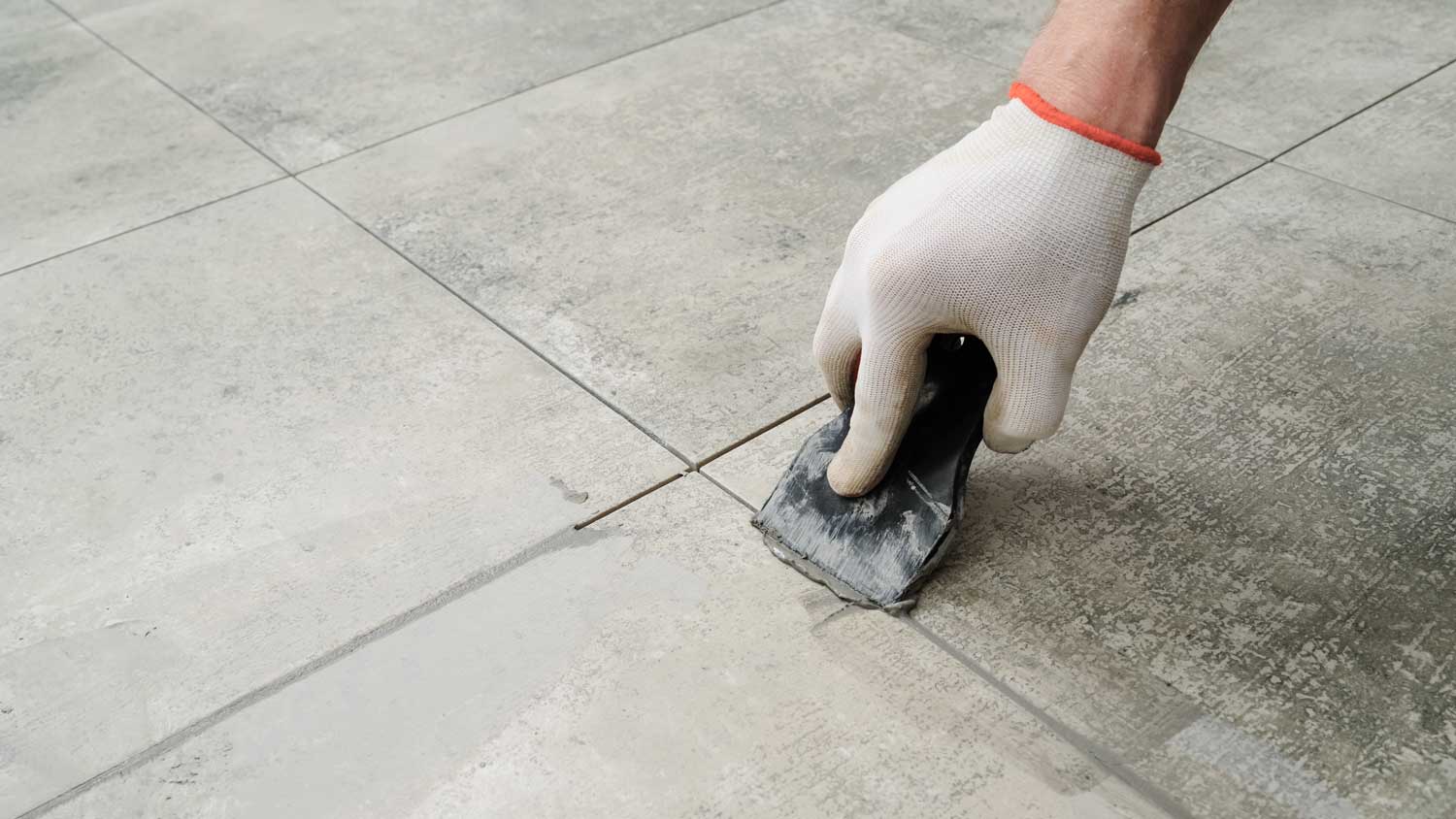
Damaged tiles should be fixed right away. In this guide, find out all of the different factors that affect your tile repair cost.
When it comes to epoxy grout, durability is the name of the game


Epoxy grout is a durable mix of epoxy resin, silica fillers, and hardeners that stands up to water, stains, and chemicals.
Epoxy grout costs three to five times more than cement grout.
When installed and maintained properly, epoxy grout lasts up to 20 years.
Epoxy grout is a highly durable, resin-based grout that’s easy to maintain. It’s a worthy competitor to cement-based grouts, but is it the right choice for your tile installation project? Read on to see what epoxy grout is all about, including its advantages, disadvantages, and how well it stacks up to cement-based grout.
Epoxy grout is a type of grout used to install tiles on floors, walls, and other surfaces. Yes, choosing an attractive yet durable tile should be top of mind. However, it’s the proper choice of grout that will prevent moisture from seeping in and maintain tile stability even as temperature fluctuations cause them to expand and contract.
Unlike cement-based grouts, epoxy grout is a mixture of epoxy resin, silica fillers, pigments, and hardeners. This blend of ingredients creates a highly durable, non-porous grout that stands up well to water and stains, making it a good choice for high-moisture and high-traffic areas in your home.
For starters, epoxy grout is non-porous, so it stands up well to water and stains. When it cures, it creates a rigid, compression-resistant base for tiles, allowing them to remain firmly in place even as temperature changes cause tiles to shift.
When used correctly by a professional tile contractor or an experienced DIYer, an epoxy grout tile installation can last between 15 and 20 years. Plus, epoxy grout doesn’t require nearly as much maintenance as cement-based grouts, so it will look better for longer with much less work on your part.
Epoxy grout is a costly option, and not by a little. It can cost three to five times more than cement-based grout. Its thick consistency can make installation more difficult, so it's often a grout we recommend for pro installation. Additionally, the thickness is better for tile installations with wider joints, so choose a different type of grout if your joints are less than 1/8-inch wide.
Epoxy grout dries fast. While this sounds like a benefit, it actually makes the job harder. You’ll have to work quickly if you choose to DIY, especially with cleanup (epoxy can stain porous surfaces). Although epoxy grout is easy to clean and maintain, it might show signs of yellowing and other wear over time.

Despite its durability and easy maintenance, epoxy grout might not be the clear choice over cement-based grouts for certain tile installations. Let’s take a look at how they stack up:
| Feature | Epoxy | Cement |
|---|---|---|
| Porosity | Non-porous (water-resistant) | Porous (not great for wet areas) |
| Maintenance | Little required | Needs regular sealing |
| Installation | Challenging | DIY-friendly |
| Preparation | Machine mixing needed | Can mix manually |
| Dry time | Faster | Slower |
| Ideal tile type | Sealed | Natural stone |
| Cost | More costly | More budget-friendly |
One thing to mention is that you can find some premixed epoxy grouts on the market. However, depending on the size of your tile installation project, premixed grouts can also be budget-breaking.
There’s no doubt that you should consider using epoxy grout if your goal is a tile installation that’s easy to maintain and will look great for years, if not decades. For these reasons, it can be worth the extra cost. However, the size of the project and the type of tile you intend to use should determine whether you go with epoxy grout or cement-based grout.
Epoxy grout can be difficult to work with, especially if you are just getting started as a DIYer, so we recommend leaving your tile installation in the hands of a local tile contractor.
From average costs to expert advice, get all the answers you need to get your job done.

Damaged tiles should be fixed right away. In this guide, find out all of the different factors that affect your tile repair cost.

If the grout in your shower has seen better days, it’s time to consider replacement. Whether you hire a pro or DIY, here is everything that affects your cost to regrout a shower.

Discover the average cost of grout repair, key price factors, and tips to save. Get expert advice to plan your grout repair project with confidence.

If you’re starting a bathroom refresh, you may wonder if you can paint shower tile. Find out everything you need to know about shower tile paint in this guide.

If you’re wondering how long it takes for grout to dry, our guide has the answers. Letting grout dry and cure completely ensures a long-lasting tile job.

Looking for new bathroom tile to freshen up your space? Use this guide to find the best tile for your bathroom floor for appearance, longevity, and durability.